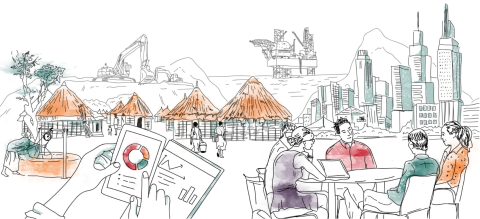
Does civil society participation influence EITI outcomes?
Multi-stakeholder initiatives like the EITI are premised on the assumption that civil society’s participation will improve governance outcomes. Yet this has gone largely untested, not least because the effects of multi-stakeholder participation are hard to measure. A research collaboration between the University of Oslo and former and current EITI International Secretariat staff was recently published in Resources Policy, and examines how civil society participation influences EITI results and whether the findings change when civic space is restricted. The authors present their research below.
Why it matters
EITI implementation requires the full, active and effective participation of civil society. Yet what this means in practice – and the extent to which EITI has been successful in taking action when governments limit civic space – is not universally agreed. How the EITI’s civil society protocol should be interpreted is widely debated and has a bearing on how the EITI process is undertaken in countries. This is a challenging debate, particularly because there is a lack of evidence that civil society has a positive impact on multi-stakeholder efforts to improve public governance. There’s an elephant in this room: Does civil society participation matter?
To test this assumption, we focused our research on the following questions:
Does civil society participation contribute to EITI outcomes?
Does that contribution vary across different types of EITI outcomes?
How do limits on civic space affect civil society’s contribution to EITI outcomes?
(See also the overview of findings at the end of the blog for details).
How we did it
To test our research questions, we used data from 63 EITI Validations, drawing on results of countries’ progress in meeting the requirements of the EITI Standard.
Our analysis distinguished between civil society participation and restrictions inside and outside national EITI multi-stakeholder groups (MSGs). We created separate indicators for both of these, using both EITI Validation data and third-party comparative data. We also tested relationships between these different variables, such as the relationship between different levels of participation inside and outside of the MSG. To measure EITI outcomes and how these were affected by participation variables, we used Validation results showing progress on five EITI requirements.
Yes, civil society participation makes a difference...
Our analysis found positive correlations between civil society participation and most EITI outcomes. The effects weren’t large or uniform, but they were consistent enough to support the assumption that civil society participation in multi-stakeholder processes improves governance outcomes, at least moderately.
Stronger civil society participation generally correlated with more revenue data, better assurance processes, improved public debate, and more follow-up on lessons learned. Contrary to the assumption that external audiences drive accountability processes, negotiation and deliberations within MSGs showed a strong relationship to accountability outcomes.
It is also worth noting that the analysis highlighted the interaction between civil society outside and within MSGs. These do not always reinforce each other, but the positive contributions of participation are strongest when they do. While our analysis did not explain why this is the case, the findings suggest that the relationship and power dynamics between different civil society organisations are more significant than has been suggested by previous research.
…but context matters
While restrictions placed on civil society participation in EITI MSGs had a negative effect on EITI outcomes, wider restrictions at the national level did not.
These findings may be controversial, as they could undermine arguments to protect civic space more widely and may imply that the EITI operates in a kind of bubble. On the other hand, the differing levels of civil society participation inside and outside of MSGs show that context matters. We’re just not sure how, and large-scale statistical analysis would require defining different “types of national/MSG contexts” into which countries can be categorised. Moreover, it would require more targeted quantitative research on how civil society organisations in MSGs relate to civil society outside those groups.
Nonetheless, this analysis offers a few important lessons:
Civil society participation probably strengthens EITI outcomes, at least moderately.
Civil society participation both inside and outside of the EITI process have an effect on EITI outcomes, but in different ways and independent of one another.
The way that civil society inside MSGs relate to civil society outside MSGs may affect EITI outcomes, but we need to better understand the different ways this takes place across different country contexts.
Wider limitations on civic space do not necessarily limit civil society’s contributions to EITI outcomes and appear to be distinct from restrictions on civil society participation inside of MSGs. Better models and further research are needed to understand how these dynamics interact.
In sum, our analysis supports the assumption that civil society participation strengthens EITI outcomes. But it also cautions against categorical thinking. It would be overly simplistic to think that civil society participation is a silver bullet, or that the EITI won’t work when civic space is limited. Context is as important as it is complicated, and we need a more thoughtful approach to understanding how participation works in practice.
Overview of findings and hypotheses
Research Question (RQ) 1: To what extent does civil society participation in MSGs contribute to EITI outcomes? | |
Hypothesis (H) 1: Civil society (CS) participation in MSGs contributes to EITI outcomes. | Moderate support. Demonstrable correlation for Rules, Debate and Review, in models that only include one participation variable. Effects are strongest for Review. |
H2: Engagement and participation of CS outside of MSGs contributes to EITI outcomes. | Moderate support. Demonstrable correlations for Rules and Quality in models that only include one participation variable. |
H3: Participation of CS inside and outside of MSGs are mutually reinforcing in their contribution to EITI outcomes. | Contradicted. No discernible interaction or moderation. |
RQ 2: How does the civil society’s contribution vary across different types of EITI outcomes? | |
H4: CS participation outside the MSG has a stronger correlation with transparency outcomes, compared to CS participation inside the MSG, which has a stronger correlation with accountability outcomes. | Supported. MSG and non-MSG participation have a similar correlation with transparency outcomes (significant for Rules only), but only participation within the MSG has a significant correlation with Accountability variables, which is strongest for Review. |
H5: CS participation has a stronger correlation with outcomes that are directly managed by the MSG than on those where other actors play a key role. | Moderate support. MSG participation only has a correlation with outcomes over which the MSG has direct control, while non-MSG participation has correlation with both types of outcomes. |
RQ 3: How do limits on civic space and participation affect civil society contributions to EITI outcomes? | |
H6: The contribution of civil society participation in MSGs on EITI outcomes will be influenced by unrestricted participation in MSGs. | Supported, particularly regarding outcomes of Comprehensiveness and Quality where actors outside the MSG play a decisive role. |
H7: The contribution of civil society participation outside of MSGs on EITI outcomes will be influenced by unrestrictive participation in MSGs. | Contradicted. No significant moderation or interaction. |
This blog is written by the authors of the research article “Does civil society matter for natural resource governance? A comparative analysis of multi-stakeholder participation and EITI Validation outcomes”, published online in the scientific journal Resource Policy in April 2021, and made available on an Open Access Licence by the University of Oslo.




